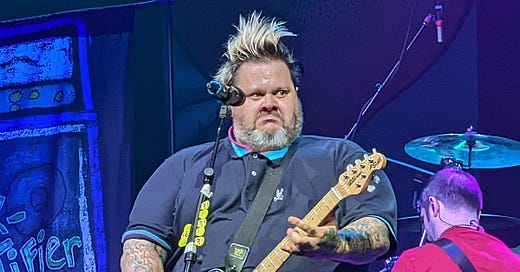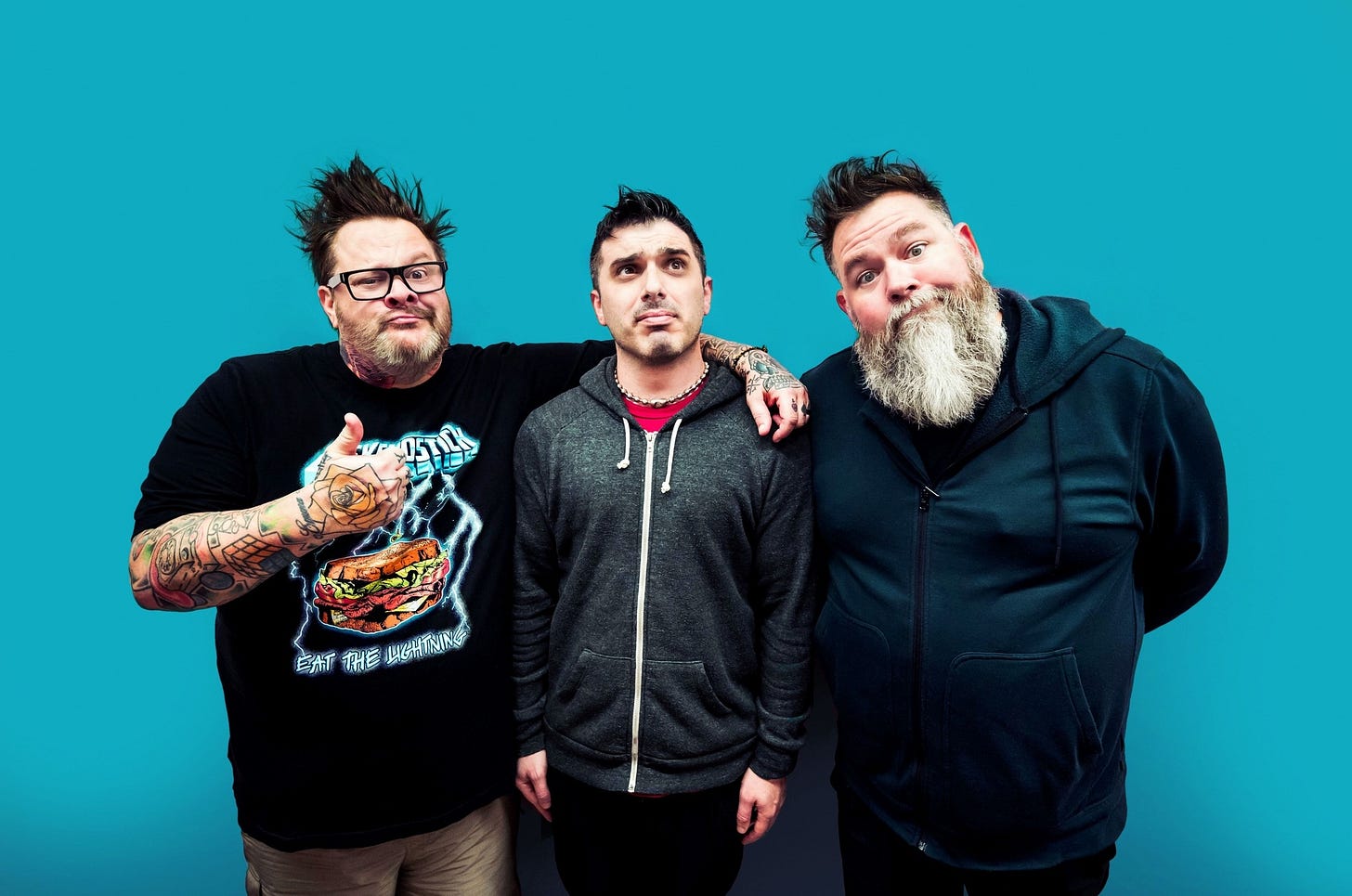The Country Punk: A Conversation with Bowling For Soup's Jaret Reddick
From fronting Bowling For Soup to being the voice of Chuck E. Cheese, there might be no punk musician with a more interesting career than Jaret Reddick
Everyone I’ve interviewed for this newsletter has been pretty nice. But I don’t know if anyone has been nicer than Jaret Reddick. Within moments of speaking, I felt like I was talking to an old friend. Though I didn’t know him before we hopped on the phone, Reddick’s voice was very familiar to me. He’s the frontman and lead songwriter of pop punk legends Bowling For Soup. Their 2004 album A Hangover You Don’t Deserve and hit single “1985” were staples in our family minivan.
And while Reddick has done so much over the last three decades in Bowling For Soup, his career has been so much more varied than that. He’s the current voice of Chuck E. Cheese. He’s a social media star. He performed the theme song to the hit television show Phineas and Ferb. Plus, he’s got a great country records out. Over an hour, we talked about it all.
Though you’ve spent much of your career making punk music, you recently put out a country record called Just Woke Up. On that record, you reimagined some of your Bowling For Soup songs, including “Ohio (Come Back to Texas).” That rendition is bonafide country. But if you go back to the version on Bowling For Soup’s 2004 record A Hangover You Don’t Deserve, it sounds like it could be nothing other than a punk song. Obviously, songs aren’t tied to specific genres, but what do you think determines genre?
Instrumentation, attitude, and delivery are the three big things. That’s an interesting song for you to pick because many of my songs start out as country songs, just me and an acoustic guitar. It’s a story and a melody. When I bring a song to Bowling For Soup, we add distorted guitars and some vocal grit. Throw on some fast, octave guitars and vocal harmonies and drums, and then it becomes a punk song. But if you pull all that stuff back, you’re left with a country song. You can sort of make any song a country song or a pop punk song.
It’s interesting that you mention attitude because on the opening lines to that album are, “I sing in a punk rock band / And I know every word to that Eminem song ‘Stan’ / And I’ve got about 110 tattoos / But I’m way more country than you.” That line suggests that country is about attitude as much as instrumentation.
So, that song was written with sort of a snarky attitude toward Nashville. The whole country scene is there. I don’t hate it, but it’s not my kind of country. And I think many of the country fans and artists of today are different from how I am country. I live in Dallas, Texas. I’m in a pop punk band. But my first car was a truck. I had a long mullet. I had an accent that took a long time to get rid of. I have big belt buckles. I’m country in a Texas kind of way.
That song was also inspired by the death of Kenny Rogers. After he died, I wrote this long post about how much his music meant to me. My buddy Zach — he’s the guy that produced this record — was like, “It’s crazy when you post stuff like this. Nobody expects it.” So, I really leaned into it on this song and the record.
Kenny Rogers fascinates me because he started in sort of the rock world and then became one of the biggest country artists of all-time.
To his credit, he’s one of the greatest musical storytellers too. I mean “The Gambler” is one of the most visual songs ever written. You can see it happening in your head. When he sings, “But you could've heard a pin drop when Tommy stopped and locked the door” on “Coward of the Country,” you can’t help but get chills.
Bowling For Soup has been around for decades, but I’m curious at what point was it when you knew that you made it. Was it when you were signed? Nominated for a Grammy? Book your recent shows at Wembley? Something else?
I think it started when “Girl All the Bad Guys Want” was nominated for a Grammy. We got signed in 1999, but by then we’d already been a band for five years. When we finally had a hit in 2003, we’d been at it for almost a decade. But even then, we weren’t making much money because it was peak file-sharing. We were working so hard at that time that we never got a chance to stop a say, “Wow, we made it.”
Still, I think it started with the Grammy nomination. Then not long after “1985” was on VH1 all the time. At that point, it really started to sink in. By then, I could feed my family and put a roof over my head. I never got the McMansion and hot cars, but when you can pay your bills and put your kids through college, you made it. I have zero complaints about my career. We’re 30 years in and booking our biggest shows ever.
I play music. A few weeks ago, my cousin and I were playing a cover gig at a local bar when we decided to play Bowling For Soup’s “Almost.” While we were learning it, we were like, “Damn, this is a really well-written song.” I want to talk about your songwriting a bit. Beyond Kenny Rogers, who are your biggest writing influences?
I learned to write lyrics from Willie Nelson, Waylon Jennings, and Johnny Cash. These were artists that my mom listened to. The first music that I discovered was hair metal. Motley Crue is the reason I got my first drum set and wanted to be in a band. Once I discovered punk rock in the early-1990s, everything made sense. It didn’t have to be about the right look. You could just write songs and have fun.
I credit the Descendents, Bad Religion, NOFX, and early Green Day for really showing me the direction that I wanted to go in musically. For lack of a better term, it’s a big soup of influences. I’ve never said that before, which is a hilarious remark for this interview. Country showed me story songs. Motley Crue showed me I wanted to be in a band. The Descendents showed me the direction to go in.
Wanting to be in a band is one thing, but you’ve cowritten most of Bowling For Soup’s songs since the band’s inception. Did writing come naturally to you?
No. As I said, I was a drummer first. But none of the bands I was drumming for wrote their own songs. So, I got a guitar and learned how to do it out of necessity. The first songs that I wrote were these silly punk songs. I started playing those songs with this kid named Eric Walker. We started a band called Number 2, for poop. We wrote a bunch of songs about girls and taking a shit and nymphomaniacs and stuff like that. It sort of progressed from there, especially when I realized I liked to be in front with a microphone.
Your music is laced with humor. I chuckled the other day when I was listening to “On and On (About You)” and after singing the chorus in Spanish, you sing, “I just said…” and then proceed to sing the chorus again in English. Also, your Spotify biography says that Bowling For Soup is “Easily the 9th greatest pop punk band in history.” But at the same time, you pair that humor with heart-on-your-sleeve honesty. Have you always been drawn to pairing those opposites?
For sure. That came organically to me. When I first started writing, I was very self-conscious. I didn’t want people to think that I thought I was poetic or something. So, every time I wrote a serious song, I’d spin it in a funny direction. Over the years, I got more comfortable putting out serious stuff, but my style of writing began as a defense mechanism.
At the same time, I’ve always had this dream of being a stand-up comedian. Bowling For Soup sort of allowed me to be a musician and a comedian. If you ever see us live, you’ll know that half the show is us just talking and goofing around. Sometimes people will yell, “Play a song!” But if you’re only there for the music, you’ve come to see the wrong band. I love the fact that we're serious about not being serious. I love the fact that you can listen to us after a hard day, and even if we're kind of like tugging at your heart strings a little bit, there's going to be that little smirk that cheers you up on a Friday afternoon.
I also noticed that throughout your songs you like to insert a variety of cultural references. “1985” is the biggest example of this, but “High School Never Ends” also shouts out Bill Gates, Jack Black, Reese Witherspoon, and a few others. Why do you think you are drawn to inserting pop culture into your songs?
Keep reading with a 7-day free trial
Subscribe to Can't Get Much Higher to keep reading this post and get 7 days of free access to the full post archives.






